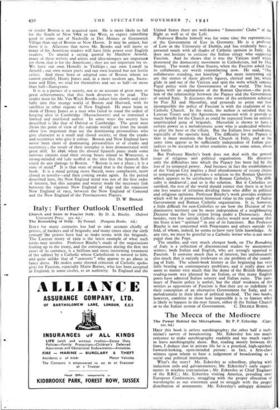Italy: Further Outlook Unsettled
The Remaking of Italy. By Pentad. (Penguin Books. 6d.)
ITALY for many centuries has had to take account chiefly of priests, of bankers and of brigands; and many times since the sixth centturibe priests have had to make terms with the brigands. The Lateran treaty of 1929 is the latest example of what such terms may involve. Professor Binchy's study of the negotiations leading up to the treaty, and the consequences during the first ten years of its currency, is a brilliant and most interesting treatment of the subject by a Catholic whose Catholicism is natural to him, and quite unlike that of " converts " who appear to go about in fancy dress. He makes some shrewd criticism of Catholic apolo- gists for Fascism, especially Major Barnes, who has been accepted in England, in some circles, as an authority. In England and the
United States there are well-known " Innocents' Clubs " of the Right as well as of the Left.
Professor Binchy himself was for some time the representative of the Government of Eire in Germany. He is a professor of Law in the University of Dublin, and has evidently been in personal touch with all shades of. Catholic opinion in Italy. He does not hesitate to criticise the Italian clergy who supported Fascism. And he shows that it was the Vatican itself which destroyed the democratic movement in Catholicism, led by Don Sturzo. The words of Don Sturzo, when the Fascists asked him to collaborate, are worth remembering now. He said, "One collaborates standing, not kneeling." But more interesting still are the stories of those ghostly figures, clerical and lay, which glide in and out of the Vatican and spin the webs which connect Papal policy with the Governments of the world. The book begins with an explanation of the Roman Question—the prob- lem of the relationship between the Papacy and the Government of united Italy. It discusses the terms of the settlement achieved by Pius XI and Mussolini, and proceeds to point out how incompatible the policy of Fascism is with the traditions of the Catholic Church. In the main, the author is satisfied that the Lateran Treaty and the Agreement connected with it provide as much benefit for the Church as could be expected from an entirely unprincipled gang of brigands. Mussolini is shown to have a certain power as a melodramatic actor who is undecided whether to play the hero or the villain. But the Italians love melodrama, especially of the operatic kind. The difficulty for the Papacy is that it must maintain the Italian Church in Italy, and at the same time appear to be sufficiently independent of Italian pre- judices to be accepted in other countries as, in some sense, above the battle.
But Professor Binchy's book does not deal with the general issue of religious - and political organisation. He discusses only the difficulties into which the Papacy has been led by the loss of its temporal power. And because in fact the establishment of the Vatican City implies a final abandonment of recent claims to temporal power, it provides a solution to the Roman Question which appears to be satisfactory to Roman Catholics. The diffi- culty is mediaeval ; and so is the solution.. But if Catholics are satisfied, the rest of the world should rejoice that there is at least one less source of irritation dividing those who differ in political and religious opinions. Professor Binchy's work provides evidence which will be of permanent historical value in the study of Italian Government and Roman Catholic organisation. It is, however, a little difficult for non-Catholics to see how the Dictator of the diminutive territory can be more independent of a neighbouring Dictator than the free citizen living under a Democracy. And, besides, very few outside Catholic circles would now assume that the State is not " spiritual " in any of its functions. But Professor Binchy is not concerned with Protestants and others outside the fold, of whom, indeed, he seems to have very little knowledge. At any rate, we must be grateful to A. Catholic writer who is not more papal than the Pope.
, The smaller, and very much cheaper book, on The Remaking of Italy is a collection of disconnected studies by anonymous writers, both Italian and English, who are strongly opposed to Fascism. It contains much that is of interest, but unfortunately also much that is entirely irrelevant to the problem of the remak- ing of Italy. The school-book history at the beginning has very little bearing on contemporary problems; and it really does not seem to matter very much that the dome of the British Museum reading-room was planned by an Italian, or that many English poets have admired Italian scenery and Italian ruins. The sum- mary of Fascist policy is useful; but the chief weakness of the writers as opponents of Fascism is that they .are so indefinite in their conception of an alternative Government for Italy, and so melodramatic in their ideas of political method. The two books, however, combine to show how impossible it is to foresee what is likely to happen in the near future, either to the Italian Church
or to the Italian system of Government. C. DELISLE BURNS.






















 Previous page
Previous page